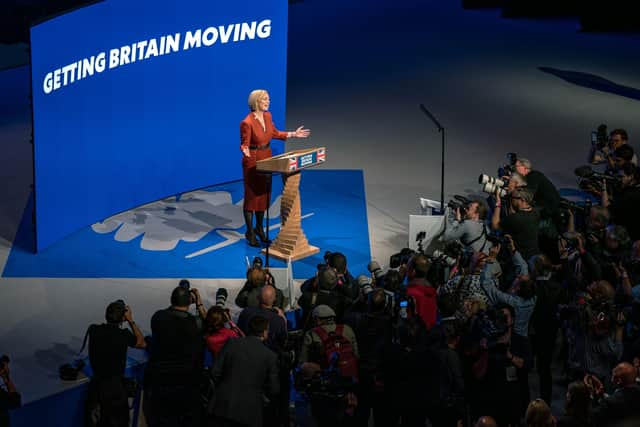Ben Lowry: It does seem that the UK is edging towards a deal with the EU over Northern Ireland, but not yet


The media focus was on the political turbulence caused by Liz Truss and her chancellor Kwasi Kwarteng’s uncosted mini budget of last month, and whether the prime minister could recover from it.
This drama was a cloud over the conference, making it more subdued than normal, but it was still a bustling event, as the Tory party annual gathering always is. There were multiple discussions on matters from housing to Ukraine to the future of conservatism.
Advertisement
Hide AdAdvertisement
Hide AdThe big question from a unionist perspective was whether or not the UK was softening its robust line on overhauling the Irish Sea border.
At the International Convention Centre I watched from the auditorium as Steve Baker, the junior Northern Ireland Office minister, apologised to Ireland.
Sitting beside his fellow NIO minister Lord Caine and also the secretary of state Chris Heaton-Harris, Mr Baker said that “... it’s with humility that I want to accept and acknowledge that I and others did not always behave in a way which encouraged Ireland and the European Union to trust us to accept that they have legitimate interests ...”
He pledged to “work extremely hard to improve relations” with Ireland.
Advertisement
Hide AdAdvertisement
Hide AdThis was the latest of several signals of a possible retreat from the government commitment to minimise the internal trade barrier between Great Britain and Northern Ireland.
One such signal came in August, when Ms Truss arrived in Northern Ireland for the local Tory leadership hustings and wrote an essay for us about her vision if she won the contest against Rishi Sunak.
References in her article it to NI were vague so we asked if Ms Truss would insert a paragraph committing to undiluted passage of the Northern Ireland Protocol Bill, which she had championed in cabinet amidst alleged wavering from her predecessor Boris Johnson and her leadership rival Mr Sunak.
She declined to make such a commitment and we reported that on our front page. But there was little political reaction to that refusal and local Tories barely even asked her about it during their grilling of the candidates later that day. Perhaps Ms Truss concluded that there was little concern about possible dilution of the controversial bill (incidentally it was in answer to a question from me at a Tory fringe meeting that Michael Heseltine said that the protocol bill would be “massacred” in the Lords).
Advertisement
Hide AdAdvertisement
Hide AdAnother signal was the sudden, warm meeting between Mr Heaton-Harris and the assertively nationalist Irish foreign minister Simon Coveney at Hillsborough Castle last month.
A further signal came a week ago, when the UK foreign minister James Cleverly spoke by phone with the European Commission negotiator Maros Sefcovic and launched a return of protocol talks.
And then there was the conference.
Not only did Mr Baker apologise but the EU ambassador to the UK João Vale de Almeida held a reception at which he echoed Mr Coveney’s words at Hillsborough, saying there had been more conciliatory messages from the UK.
A rumour swept the conference on Monday that the UK and EU had already reached a deal over NI.
Advertisement
Hide AdAdvertisement
Hide AdThis did not sound absurd. I remember well attending a packed DUP reception at the 2019 Tory conference in Manchester, where which Boris Johnson addressed to cheers, and the next day the first iteration of his protocol was unveiled (backed by the DUP on the basis that it had a Stormont lock and kept NI out of EU customs).
I recall how Mr Johnson, in his main address to Tory delegates that day in front of stage signs that read ‘Get Brexit Done’, didn’t mention NI, about which he had professed so much concern the night before.
Last week, Ms Truss said nothing of note about the NI Protocol in her brief address to Ulster Tories on Tuesday night. Mr Heaton-Harris and Mr Baker spoke after her said nothing at all about it. NI Tories cheered them to the rafters nonetheless.
From a unionist perspective none of this was promising. Mr Baker had qualified his apology by saying it should not be misunderstood as a lessening of UK resolve on the protocol.
Advertisement
Hide AdAdvertisement
Hide AdEven so, I speculated on our front page on Wednesday that a deal over NI might be near. Pundits at the conference had thought that Ms Truss so damaged by the budget she would have to strike a deal with the EU over NI to get it off her plate.
The (since dismissed) government minister Conor Burns implied agreement was within reach.
But I have been talking to influential unionists since then and they say the gap between the UK and European Commission is still too wide, and the EU has not given Mr Sefkovic a new mandate to make major concessions on the protocol. At best Europe can offer a reduction of checks on goods across the Irish Sea, but no alleviation of the constitutional damage.
There is though a feeling that the Irish government is being more flexible over the protocol than a few years ago.
Advertisement
Hide AdAdvertisement
Hide AdMr Coveney’s comments at Hillsborough were, by his standards, conciliatory. He specifically referred to unionist concerns.
When, yesterday, he told RTE that Mr Baker “has recognised that some of his contributions towards solving Brexit problems haven’t been helpful” it seemed that he was seizing on the NIO minister’s contrition. That seemed proof that the apology was naive.
Perhaps though Mr Coveney was seizing on it as cover for Dublin’s own change of tack.
Even if so, it is unlikely to be the sort of concessions unionists want to see but rather a partial climbdown that leaves the NI Protocol largely intact, but less intrusive.